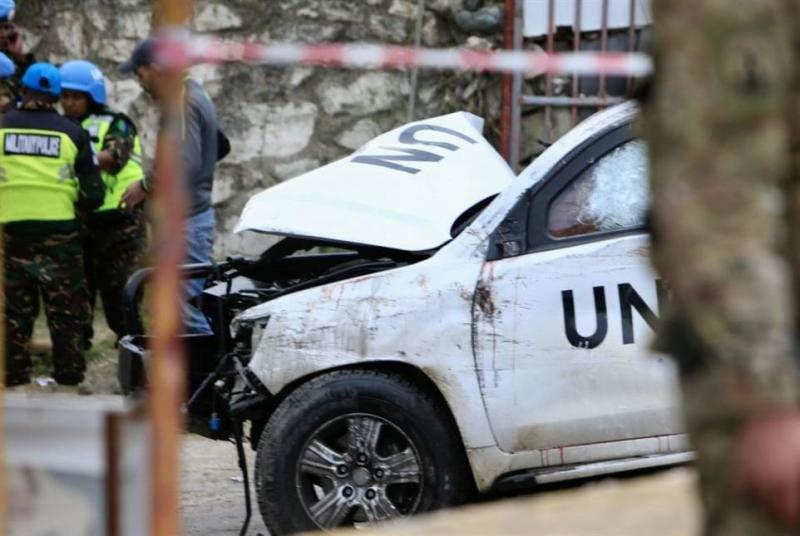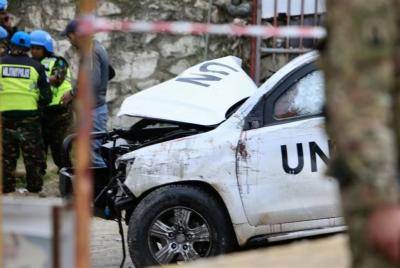Were it not for the serious attack on a UNIFIL vehicle in the south and the death of an Irish unit member by gunfire, along with injuries to three others, the political atmosphere in Lebanon would have been relatively relaxed on the eve of the Christmas and New Year holidays, as if the country were not walking a “tightrope” over the mouths of raging volcanoes and open gates to hell that have persisted for nearly three years. With the closure of the 2022 edition of the "suspended" presidential elections, marked with "red wax," the reopening is expected in the coming year after a complicated settlement is promoted that will reveal the name of the future president and outline a way out of the deepening financial pit. The security situation now overshadows the days leading up to New Year’s, raising fears that Lebanon has poorly managed to dissipate any remaining “capital” in the eyes of the international community.
Over the past three years, Lebanon has come close to breaking records for every negative indicator tied to financial crises dating back to 1850, without yet hitting rock bottom in its "free fall," which has now accelerated into a "new speed" with the historic collapse of the national currency against the dollar, reaching 44,000 yesterday. Lebanon concludes 2022 suggesting a crisis with the international community represented by UNIFIL forces in the south in light of the major dimensions of the Al-Aaqibia crime itself, as well as the graver implications of the trend indicating that this file may remain “open-ended.”
With international calls for a quick and transparent investigation leading to accountability for those responsible for the attack that involved gunfire on a UNIFIL vehicle, resulting in the death of the Irish soldier after being shot in the head, concerns arise in Beirut that the case may have entered a process of dilution leading to an automatic cover-up of the shooter or shooters. Alongside the promotion of the narrative of “unintentional incident,” justified by its proponents based on the vehicle taking an internal road while heading to Beirut alongside another car, political circles contend that, under no circumstances and regardless of the circumstances of the event, can the “provocative” factor represented by the “hostility” toward UNIFIL be overlooked, which has often been expressed in conflicts with the environment of Hezbollah in southern areas. This hostility has increased following the recent adjustment of the international force’s mandate by the latest UN Security Council resolution, granting it more freedom of movement without Lebanese assistance.
These circles assert that the arrest of those involved in the death of the Irish soldier is the true and “tangible” indicator that what occurred was “individual,” given that any cover-up from any party for the perpetrator or perpetrators would implicitly serve as a “signature” endorsing the crime, at the very least encouraging others. They recalled Interior Minister Bassam Mawlawi's statement that “the attack is a crime, not a coincidence or an accident,” and his rejection of “any excuse claiming that the incident was caused by locals,” emphasizing that “whoever is behind it does not hide.” He noted that “the peacekeepers’ vehicle was intercepted in two locations, according to investigations.”
Meanwhile, Hezbollah’s disavowal of what occurred in Al-Aaqibia and its outreach through the head of its Coordination and Liaison Unit, Wafiq Safa, to the leadership of UNIFIL to express condolences contributes to the perception among some circles that the party, having just emerged from covering the demarcation agreement with Israel and not opposing managing the presidential entitlement to reconnect Lebanon with the outside, has no interest in escalating this file to become a point of close international scrutiny of the Lebanese situation from a multi-faceted security angle. Other circles see the real test facing the Lebanese state as requiring much more than showing goodwill, issuing statements of condolence, or making condolence visits.
The visit of caretaker Prime Minister Najib Mikati, along with Army Chief Joseph Aoun, to UNIFIL’s headquarters in Naqoura to express solidarity with the international force and to affirm that “the environment in which the international soldiers operate is a good one, the investigations into the death of the Irish soldier are ongoing, and those found guilty will face justice” signals Beirut's desire to absorb the security shock with the international community. The arrival of an Irish team tasked with following up on the investigations into the Al-Aaqibia crime in Beirut reflects in parallel Dublin’s seriousness, backed by the international community, in pursuing the case to the end.
While the military judiciary's investigations have brought no new developments amid the lack of detentions of any of those involved, this file is now being viewed in some circles as a new aspect of the dangerous symptoms of the unraveling of the Lebanese reality, while the country struggles to regain an external umbrella to help it emerge from the heart of “hell.” As the Lebanese crisis, summarized these days by the presidential election issue, is reported to be on the agenda of the upcoming "Baghdad 2" summit regarding Iraq hosted in Jordan with the participation of French President Emmanuel Macron, it was revealed that the U.S. Senate Foreign Relations Committee sent a letter to Secretary of State Antony Blinken and Treasury Secretary Janet Yellen urging “accountability for those undermining institutions and the rule of law in Lebanon” and urging President Joe Biden to “use all means of pressure, including sanctions, to push MPs to elect a new president and form a government to implement necessary reforms.” The committee emphasized “the need for Lebanon to have a strong elected government that is not subject to malign foreign influence and prioritizes the needs of its people,” accusing “Hezbollah” and its allies, the Amal Movement and the Free Patriotic Movement, of obstructing the quorum for presidential election sessions (second rounds).




